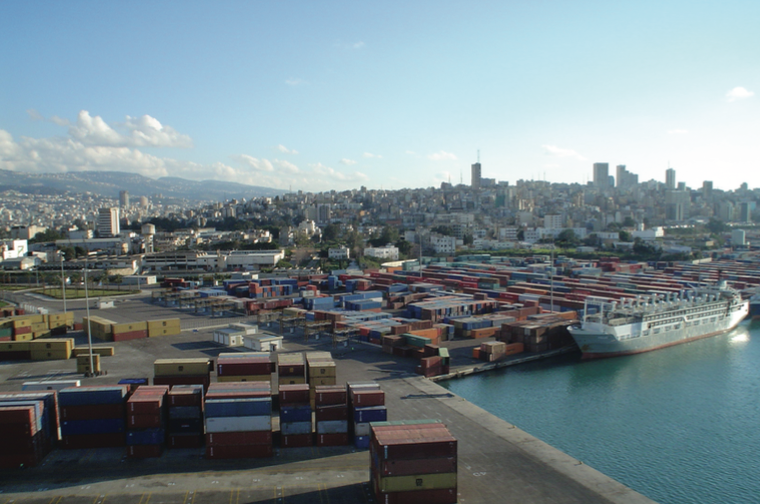Talaat Captan is not exactly the typical Hollywood producer. He started his career as a domestic and international distributor of motion pictures, moving into the rarified airs of movie production. His films have ranged from science fiction (Prototype) to psychological thrillers (Living in Peril) and action (Ground Control). Captan has also mastered the technical side of movie production as owner of companies such as Air Hollywood, Apex Stocks and Prime Pictures
E How did you get into the movie industry?
I left Lebanon for the United States 30 years ago. After graduating from business school, I worked in a company that specialized in production as well as distribution of movies. I then made the leap to the field of international movie production and licensing. The movie industry is an extremely challenging one. I did not want to work in the studio system where politics reign and preferred to achieve my objectives on my own, by launching my own production house. I also served as a director on the board of the American Film Association (AFMA) for four years, but I lost my seat on the board after 9/11, when things started to become very difficult for Arabs working in the American film industry.
E You also own Air Hollywood, how does this particular activity complement your other operations?
While producing the movie Ground Control with Kiefer Sutherland — which looks into the world of air traffic controllers — I identified the industry need for proper airplane mock-up studios, which prompted my decision to open Air Hollywood. The company features four aviation-themed stages, seven planes and a fully dedicated prop rental and fabrication house. Air Hollywood attracts major Hollywood studios as well as production companies working on films, television programs or commercials. Sets can be booked for $14,000 per day, with average rental periods varying between two to three days. However, some productions have used our sets for more than three months. Certain scenes of Lost have been shot in our studios.
All my companies are related to the entertainment industry. As an example Apex Stock is a stock footage company that provides users with scenes of airplane landing or take off, horses running wild, or Paris in the 1950s that can be used in movies. We also own the TWA 65mm library, which is a great asset in the movie industry. Apex has partnerships with big industry names, such as Getty images and National Geographic, among others.
E With two companies in the US, what brought you to the Middle East?
I am a co-founder of Prime Pictures, a company that specializes in theatrical and home entertainment distribution for a variety of studios such as Paramount, Dreamworks, and Hallmark among others. We also own a number of theatrical screens in the Middle East, with Cinema City in Beirut as part of our landmark projects. In addition, we are opening another mega theater complex in Jordan as well as one in Dubai, in the new Merdef area. We strive to achieve excellence in the theater industry, this can only be attained by providing audiences with the right theater atmosphere as well as a unique viewing experience. The Middle East is a market that is growing steadily. I would like to contribute to the regional industry by producing movies filmed in this part of the world. I have also two movie projects lined up for now, however I am still not at liberty to disclose any information.
E Are producers predominantly brought into a movie or do they seek projects?
It is a bit of both. In the United States, things are much easier because you can depend on the Writers Guild: authors either come up with a story or are asked to write a “treatment” for producers. If the treatment is approved by producers, it will be turned into a script. In the Arab region, the process is much more difficult, as the environment is less structured. Many Arab scriptwriters also find inspiration in other movies, without trying to rely on their talent.
E What management qualities are most important for movie producers?
A producer is the person who holds the whole movie together and handles more particularly its financial aspect. I am familiar with both sides of the movie business, namely production and distribution. A producer has to constantly keep in mind the marketable features of a movie and if, and how, it will appeal to audiences around the world. He needs to consider the movie’s performance in the main markets, foremost the Unites Sates, Germany, and Japan, so forth and be a few steps ahead of everyone. Approaches also vary among different movie genres. As an example, horror pictures might be easy to produce but will eliminate a certain category of audience, due to their nature. Comedy is the hardest type of movie to produce, because it very difficult to make Americans, Japanese and French laugh at the same joke. In terms of production, the US always represents 50% of a movie’s budget, as it usually generates a large proportion of a film’s revenues. As a rule, it is very difficult to produce a movie for less than $10 million, because it will be only viewed in a handful of theaters in the United States.
E How do you perceive the Arab cinema industry?
The Arab movie industry still lags behind other countries. One look at international movie festivals will reveal the relatively low participation of Arab productions. In comparison, Iranian movies are faring much better than Arab productions and are regularly featured in festivals around the world. I personally loved the Lebanese movie Caramel, which was full of talent. The region is in need of such movies. I have also noticed during my frequent trips around the world that Arabic movies are never shown on international TV channels. Arabic producers need to start working on international movies that can be released in English, which will add to their marketability.
E What changes do Arab countries need to introduce to further develop their movie industry?
Censorship is an essential issue that needs to be addressed around the region. Scripts have to be submitted to governing bodies in order to obtain authorizations for filming. In other countries, movie scripts will only be submitted against a government’s financial contribution to the film. The industry is also plagued by low budgets, which amount very often to less than $1 million, which is ridiculously low. However, large budgets do not necessarily guarantee a film’s success, because it also depends on proper budget management. Governments need to encourage movie funding and try to attract trustworthy producers by either offering tax cuts, facilitating the work environment or offering more affordable accommodation.
E What countries in the Middle East do you believe have the most potential in terms of movie production?
Lebanon offers great opportunities but its movie industry is hindered by its unstable situation. Libya is one country in the region that has not been filmed for more than 30 years! It is time to feature its beautiful landscapes in movies around the world.
E What can be the role of Arab movie producers on the international level?
They can promote a positive image of the Middle East. In the United States people can’t differentiate between Arabs, whether they are Iraqi, Lebanese or Palestinians. Arabs are many cultures within one. Movies can help educate people and change their perceptions.
E Where do you see the movie industry in a few years?
Technology is growing at an incredible rate. In a few years, people will be able to view more than 500 movies by using a small box. I think advances in special effects will significantly affect the film industry and movie making will become less and less time consuming.











